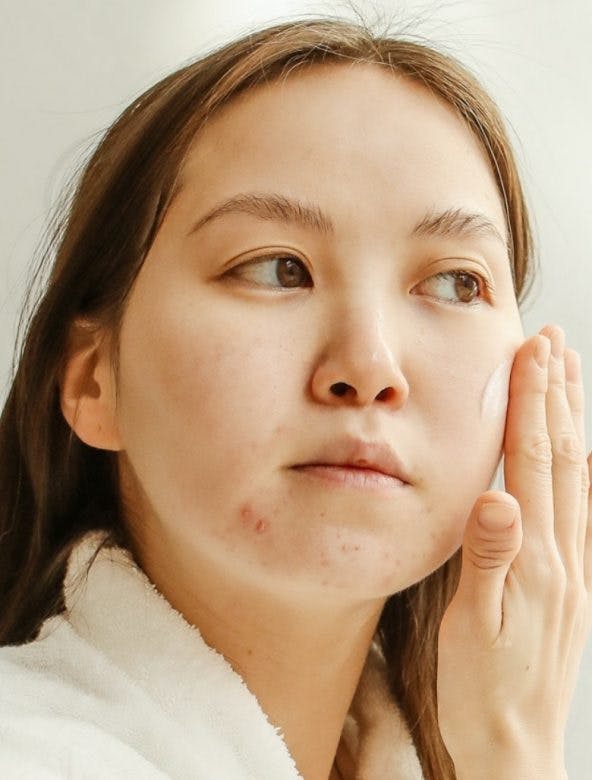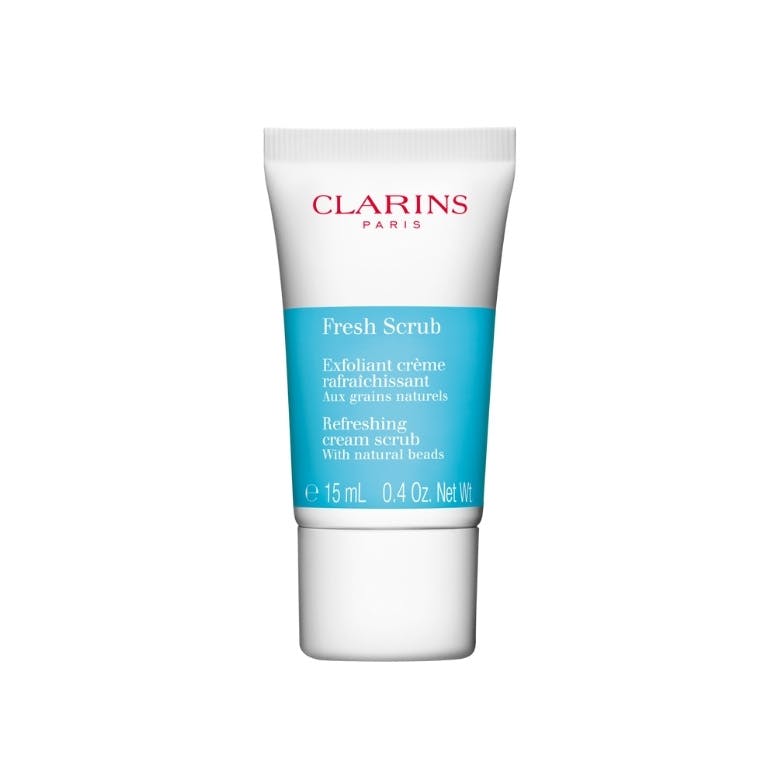How To Rejuvenate Dehydrated Skin
6 minutes read
Anyone could suffer from dehydrated skin – you could be in your 20s or 80s, as ‘dehydrated’ refers to a lack of water in the skin’s uppermost layer (also known as the stratum corneum). Up to 60% of the human body is water, and the skin contains 64% water. But various factors can lead to a dip in these levels.
It’s important to distinguish between dry and dehydrated skin. While dryness is often a skin type, dehydration is a skin condition. Dry skin lacks oil and dehydrated skin lacks moisture.
Read: What’s the difference between dry and dehydrated skin?
So, how can you tell if your skin is suffering from a bout of dehydration?
Signs of dehydrated skin
“It’s like the difference between a raisin and a grape,” explains Clarins Training Manager Charlotte McHale. “A raisin is a bit wrinkly and doesn’t reflect light, whereas a grape is lovely and light reflective. It has a smooth surface. And that’s very similar to how you would identify dehydration in the skin as well.”
She adds: “The higher the water content in the skin, the better it holds its shape.”
An easy way to check if your skin is dehydrated? McHale shares a trick you can try at home. Look into a mirror and place your index finger flat under your cheekbone. Then, lift the skin on the cheek up towards your eye. “If thin, horizontal lines appear, your skin is probably dehydrated. On the other hand, if your skin is adequately hydrated, the cheek will plump out rather than fold and corrugate.”
Some other signs you can look out for to check if your skin is dehydrated include:
Tightness
“Usually, you can feel if your skin is dehydrated because it often creates a slightly tight sensation on the face,” says McHale.
She recommends noticing how your skin feels when you leave the shower or after washing your face with water. If it feels uncomfortable and dry, that could indicate dehydrated skin.
A lacklustre appearance
Skin that’s dehydrated doesn’t look radiant and bouncy. You may also notice an increased appearance of fine lines and wrinkles, and deeper dark circles.
Excessive oil production
Often, if your skin is dehydrated, you may find that it produces more oil than normal – this is your skin’s way of compensating for the dehydration. If this is the case, don’t reach for stripping cleansers or drying clay masks as they could exacerbate the problem.
Dry patches
You may notice rough, scaly patches. Your skin could even feel itchy and inflamed. It’s important to know that your skin could be both dry and dehydrated simultaneously, which could be confusing. It’s necessary, then, to supply it with both oil and hydration.

What causes dehydrated skin?
The environment
When you’re outdoors, the cold, wind, pollution and sun exposure could all cause water loss from the skin. Similarly, when you’re indoors, air conditioning and central heating zap the moisture from the air and therefore also from your skin.
Lifestyle factors
There are tons of lifestyle choices that could impact your skin’s hydration levels. Some of them are not drinking enough water and excessive consumption of alcohol or tobacco.
Additionally, using certain harsh skincare and make-up products that strip the skin of moisture could also be the cause.
Can oily skin be dehydrated?
Yes, all skin types are susceptible to dehydration. So, even if your skin produces a lot of oil, there’s still a chance it could be lacking in water. Also, many products geared towards treating acne and blemishes can be extremely drying on the skin.
How to repair dehydrated skin
Simplify your skincare routine
Ditch all products that strip your skin of moisture. This includes excessively foaming cleansers, clay masks, drying AHAs or BHA serums and other products containing actives, as well as any toners that contain alcohol.
Instead, rebuild a new routine that’s focused on gentle hydration. Reach for non-foaming cream cleansers, soothing toners and hyaluronic acid-rich moisturisers.
Choose the right ingredients
McHale recommends looking for products with hyaluronic acid in them. It’s a naturally present substance in your skin and can hold 1000 times its weight in water. This, of course, means that it’s good at keeping water within the surface of the skin.
The Hydra-Essentiel range contains many products that cater to dehydrated skin. The key ingredient in them is kalanchoe, also known as leaf of life – a succulent that’s a relative of the aloe vera family. It’s a powerful ingredient that helps hold water and boosts the skin’s hyaluronic acid production.
Don’t forget to exfoliate
Gently exfoliating the skin once a week helps keep its surface fresh. In addition, it helps get rid of any dead skin cells that may prevent your moisturising products from penetrating deep into your skin.
Try: The Fresh Scrub exfoliates and refines the skin’s surface without drying it out. It also contains ingredients that help boost the skin’s natural hydration process.

Trap moisture
To prevent moisture loss from the skin, look for targeted treatments and oils that seal hydration. For example, we like the Blue Orchid Treatment Oil that feels lightweight on the skin and contains revitalising blue orchid and nourishing, vitamin E-rich hazelnut oil.
“Face oils help prevent transepidermal water loss,” McHale explains. “So if you use them at night, you’re less likely to lose water out of the skin and blue orchid oil is particularly good for that.”
Mist and moisturise
Give your skin a midday pick-me-up with a hydrating face mist like the Hydra-Essentiel Hydrating Multi-Protection Mist – it’s loaded with moisture-boosting ingredients like hyaluronic acid and leaf of life.
If you have an extra minute to spare, go over the mist with a layer of face cream. This will help seal the moisture and your skin will feel extra supple.
Amp up the humidity in the air
Your skin will lose less water if the air around you is humid, which is why, if you spend a lot of time indoors in dry climates, with the heating or air conditioner on full blast, it may be a good idea to invest in a humidifier.
We like the Dyson PH03 Purifier Humidify + Cool Humidifier that helps retain the right level of moisture in the air, and also doubles as an air purifier.
Stay hydrated
Although countless celebrities swear by it, there isn’t any hard evidence that states that drinking more water than you need will improve the quality of your skin.
However, there is some evidence stating that drinking less than the recommended amount of water could be detrimental to your skin’s health. So, try to ensure you’re drinking the right amount of water on a daily basis – the NHS recommends six to eight cups or glasses of fluid a day.
Next read: Learn everything you need to know about your skin’s pH level and how it affects your skin’s health.
Sign up for our newsletter
We will keep you in the loop for special offers, exclusive gifts and product news.

